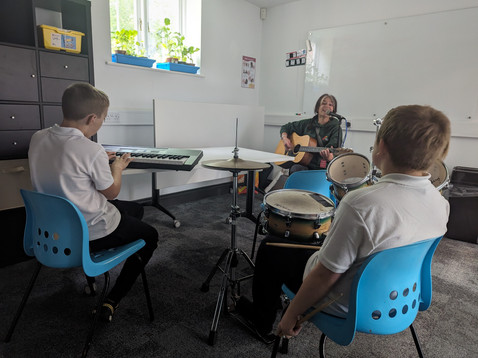
What we do
Meeting needs, supporting wellbeing, building confidence, realising potential
Our schools work with a range of needs. Typically, students have autism a complex and at times traumatic school history and some level of anxiety, demand avoidance or emotional need. All have additional complex needs and whilst diagnoses and assessments form the basis of our understanding, every child is an individual and needs staff to get to know them, what works and how to support them on the best and most challenging days.
We work very closely with families and professionals to create effective and adaptive transitions. We regularly review support and work with a range of specialists to adapt our approaches to support children into school, help them access their education and realise their potential.



What Ofsted (June 2024) say...
"Pupils are able to be themselves and express their unique personalities. Staff work hard to respond nimbly to pupils’ social and emotional needs. They apply a variety of behaviour management strategies effectively, to encourage pupils to settle, follow routines and access learning. Relationships between adults and pupils are strong."
"Staff are adept at pre-empting, managing and safeguarding pupils’ emotional and sensory needs. Pupils learn a range of ways to help themselves regulate. They trust the staff around them to help them do this. Adults and pupils have high levels of respect for each other."
"For many pupils, this is their first opportunity to engage in wider school life. They experience school trips and take part in activities linked to their interests and talents, such as in horse riding, dance and art. This develops their confidence and self-esteem. Parents also appreciate the positive impact this school has on their children."
"The curriculum is now mapped out well in all subjects. Staff know what pupils need to learn. Prior to joining the school, pupils have experienced much disruption to their learning and education. Once settled, pupils typically make good progress from their starting points."

Personal Development
Supporting and growing to be well rounded, positive members or our communities.
Preparing for life after school and the different experiences and challenges it may bring.



How do we support wider development in complex cohorts?
Personal development is different for every child.
We work together and combine meeting needs, education and development opportunities to find areas of interest and ways to provide experiences, activities and events that give students an enriching school journey and also experiences that widen their understanding and appreciation of different communities.
Examples include:
Public services
We go to libraries, were visited by a fire engine, police and nurses.
We talk about governments, voting and stay up on current events.
Culture
We learn about, enjoy and celebrate difference cultural, religious and communal events.
We embrace diversity and everything that makes us an individual and part of different communities.
Social
We offer a range of social experiences, often supporting children to create and maintain friendships for the first time. This is supported in school and on a range of enjoyable trips and events.
Wider opportunties
We are very adaptive offering a huge range of experiences, such as horse riding, animal care, rock climbing, dancing, public dance shows, yoga, gardening, 3D printing and much more...

Quality of Education
Whilst meeting need and attending school is a huge first step for the majority of our children, our core vision is to ensure they have every opportunity possible.
This means ensuring they have access to high quality teaching, learning and assessment when they are ready for it.
When a child joins us, we work closely with them and their families during their transition. We develop a clear support plan and when children are ready to engage in some education, we work gently to establish an accurate and effective understanding of their strengths and areas to focus on.
Baselines
Teachers work from a full national curriculum program and create bespoke learning plans each half term for educational, EHCP and therapy targets.
These are used to create and adapt daily planning so plans refer back to specific assessments and targets.
Planning
Teaching is interesting, adaptive and uses teachers' understanding of their students to make the most of each session.
Meeting needs first is still key and where sessions don't go as planned teachers nimbly and empathetically adapt them.
Teaching
Every lesson is dynamicly assessed and adapted, and each lesson is assessed for progress and inform the next day's plan.
Each term, students are assessed against their half termly targets and teachers identify areas of success and focus for the coming term.
Assessment

























Gaddesden is our second site, opened in March 2024.
It now comes under the same registration, and primarily caters for KS3, children aged 11-14.
Gaddesden


Grovehill is our original site, opened in 2021.
This caters primarily for our Key stage 2 children, aged 7-11.
Grovehill

Our schools
We have one school across two sites, accepting children across key stage 2 and 3, ages 7-14.

